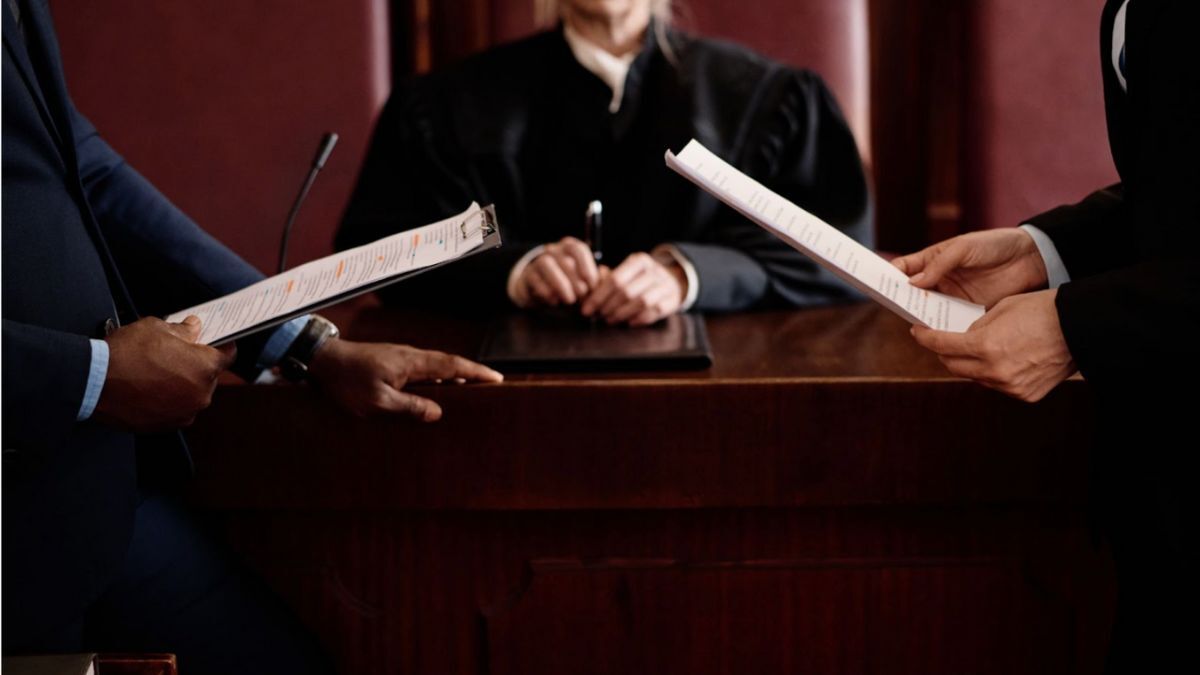What Is the Difference
Between Criminal and Civil Law?
If you’ve ever found yourself caught up in legal matters, the difference between criminal and civil law can be a labyrinth of confusion. Understanding the fundamental difference between criminal and civil law is crucial for any individual navigating the complexities of the legal system.

As you ponder the implications of the difference between criminal and civil law, you’ll uncover distinct differences that can profoundly affect the outcome of legal proceedings. If you seek further guidance on this topic, contact David E. Stanley, APLC. He is a seasoned attorney equipped to provide clarity and professional assistance tailored to your specific legal needs. With his extensive experience and dedication to client advocacy, you can trust Mr. Stanley to navigate you through the intricacies of the legal system with confidence and competence.
Overview of Legal Systems
Table of Contents
ToggleWhen delving into the difference between criminal and civil law, understanding the diverse legal systems in place is crucial. In most countries, legal systems can be classified into two main categories: common law and civil law. Common law systems are based on judicial decisions and precedents, while civil law systems rely on comprehensive legal codes and statutes.
Common law systems, which originated in England, are predominantly used in countries like the United States, Canada, and India. In these systems, judges interpret the law and make decisions based on previous court rulings. Precedents play a significant role in shaping future judgments, as decisions made in higher courts are binding on lower courts.
On the other hand, civil law systems, commonly found in European countries, Japan, and Latin America, are based on codified laws. These legal systems are more structured, with laws organized into codes that cover various areas of law.
Understanding the legal system, specifically the difference between criminal and civil law, is essential because it determines how laws are created, interpreted, and enforced. Whether you’re involved in a criminal case or a civil dispute, knowing the legal framework can assist you in navigating the complexities of the legal process. By familiarizing yourself with the legal system, you can better comprehend your rights and obligations under the law.

Nature of Offenses in Criminal and Civil Law
Understanding the nature of offenses is essential in knowing the difference between criminal and civil law. In criminal law, offenses are considered actions that are harmful to society as a whole. These offenses are seen as crimes against the state, and the main goal is to punish the offender for their wrongdoing. Crimes in criminal law can range from minor infractions like traffic violations to serious offenses such as murder or robbery. The focus in criminal cases is on determining guilt beyond a reasonable doubt and imposing penalties such as imprisonment or fines.
On the other hand, civil law deals with offenses that are considered violations of individuals’ rights rather than crimes against society. Civil offenses are often referred to as torts and can include actions like negligence, breach of contract, or defamation. In civil cases, the main objective is to provide compensation to the person who has been harmed as a result of someone else’s actions. The burden of proof is typically less demanding in civil cases as compared to criminal cases, with the standard being based on the preponderance of the evidence.
Whether you’re dealing with a criminal matter that could result in criminal penalties or a civil issue seeking compensation for damages, knowing the nature of the offense will help you determine the appropriate course of action.
Parties Involved in Criminal and Civil Law
In both criminal and civil law cases, the parties involved play distinct roles that influence the legal proceedings and outcomes. Understanding who these parties are can help you grasp the dynamics of each type of case.
Criminal Law
- Prosecution: This party represents the government and brings charges against the accused.
- Defendant: The individual or entity facing criminal charges and defending against them.
- Victim: In criminal cases, the victim is often a key witness for the prosecution, seeking justice or compensation for harm suffered.
Civil Law
- Plaintiff: Initiates the lawsuit in civil cases, alleging that their rights have been violated.
- Defendant: The party being sued and defending against the claims made by the plaintiff.
- Third Parties: Individuals or entities not directly involved in the lawsuit but who may be affected by the outcome.
In criminal law, the focus is on the state punishing individuals for violating laws, while civil law aims to resolve disputes between private parties. Understanding the difference between criminal and civil law in terms of the parties involved is crucial for navigating legal proceedings.
Burden of Proof in Criminal and Civil Law
To determine responsibility in legal cases, the burden of proof plays a crucial role. In both criminal and civil law, the burden of proof pertains to the obligation to provide sufficient evidence to support a claim. Understanding the difference between criminal and civil law is essential to grasp how the burden of proof operates in each system.
In criminal law, it is the responsibility of the prosecution to provide evidence and prove beyond a reasonable doubt that the defendant committed the crime. To establish the guilt of the defendant, the prosecution needs to provide evidence that is convincing and compelling enough to leave no reasonable doubt in the minds of the jurors. In other words, the prosecution must prove the defendant’s guilt beyond a reasonable doubt, which means that there should be no reasonable doubt in the minds of the jurors that the defendant committed the crime. It’s a high standard of proof intended to protect individuals from being wrongfully convicted. This high standard underscores the critical difference between criminal and civil law.
On the other hand, in civil cases, the burden of proof usually rests with the plaintiff. The plaintiff is required to prove their case on the balance of probabilities. The legal standard of proof in civil cases is lower than that in criminal cases. In order to hold a defendant liable, the plaintiff must present evidence that proves it is more likely than not that the accused is responsible for the harm or damages alleged in the case. This is known as the “preponderance of the evidence” standard, and if the plaintiff fails to meet this burden, the defendant will prevail. This lower standard is a significant difference between criminal and civil law.
It’s important to note that the burden of proof can shift during a case depending on the evidence presented. This dynamic aspect of legal proceedings further highlights the difference between criminal and civil law.
Understanding the burden of proof is essential, as it determines the outcome of legal disputes. Whether you’re the prosecution in a criminal case or the plaintiff in a civil case, knowing your burden of proof is critical to presenting a convincing case in court. This understanding is pivotal in appreciating the difference between criminal and civil law.

Penalties and Remedies in Criminal and Civil Law
Penalties and remedies in legal cases serve as consequential measures to address wrongdoing and provide redress for harm caused. When navigating the realms of civil and criminal law, understanding the distinctions between penalties and remedies is crucial. Here’s a breakdown to help you differentiate between the two and further understand the difference between criminal and civil law:
Penalties in Criminal Law
- Criminal cases aim to punish individuals for violating the law.
- Penalties in criminal law can include imprisonment, fines, probation, or even the death penalty in severe cases.
- The burden of proof in criminal law is ‘beyond a reasonable doubt,’ ensuring that penalties are only imposed when guilt is established with high certainty.
Remedies in Civil Law
- Civil cases focus on resolving disputes between individuals or entities.
- Remedies in civil law are designed to compensate the injured party and restore them to their pre-damaged state.
- Common civil law remedies include monetary compensation (damages), injunctions, specific performance, or declaratory judgments.
Understanding the distinct purposes of penalties in criminal law and remedies in civil law is essential for comprehending the outcomes and goals of each legal system. Whether seeking justice for a crime or seeking redress for a civil wrong, the appropriate penalties and remedies play a vital role in ensuring fairness and accountability in legal proceedings.
Frequently Asked Questions
Can a Criminal Case Also Involve Civil Proceedings or Vice Versa?
Yes, a criminal case can also involve civil proceedings or vice versa. For instance, a person acquitted in a criminal trial can still face a civil lawsuit for the same incident. The outcomes differ, highlighting the difference between criminal and civil law.
How Do Statutes of Limitations Differ Between Criminal and Civil Cases?
Statutes of limitations differ between criminal and civil cases. In criminal proceedings, they’re usually shorter due to the urgency of addressing alleged crimes. Civil cases dealing with disputes often have longer statutes for individuals to seek resolution. This illustrates the difference between criminal and civil law in terms of legal timeframes.
Are There Different Standards of Evidence Required for Criminal Versus Civil Cases?
Yes, there are different standards of evidence required for criminal versus civil cases. In criminal cases, the standard of evidence required is “beyond a reasonable doubt,” which means the prosecution must prove the defendant’s guilt with convincing certainty. In civil cases, it is a “preponderance of the evidence,” which is less demanding, showcasing the difference between criminal and civil law in terms of evidentiary standards.
Can the Same Act Be Charged as Both a Criminal Offense and a Civil Wrong?
Yes, the same act can be charged as both a criminal offense and a civil wrong. In criminal cases, the state seeks punishment, while in civil cases, individuals seek compensation. It’s possible to face both types of charges for one action, emphasizing the difference between criminal and civil law in terms of potential legal consequences, reflecting the difference between criminal and civil law in legal representation.
How Do the Roles of Lawyers Differ in Criminal and Civil Cases?
The roles of lawyers differ in criminal and civil cases. In criminal cases, lawyers represent the state or defendant in prosecuting or defending against charges. In civil cases, lawyers advocate for plaintiffs or defendants in disputes over rights or damages. Different roles, same dedication.
Highly-Regarded Criminal
Defense Law Attorney

David E. Stanley, APLC, is a highly-regarded criminal defense law attorney. He can guide you to understanding the difference between criminal and civil law. Knowing these distinctions can guide you in navigating the legal system more effectively and understanding your rights and responsibilities. Stay informed and protect yourself in any legal situation.
Trust in the experience and professionalism of David E. Stanley, APLC, as reflected in his track record of success. He is committed to maintaining the highest standards of merit in his profession.
David E. Stanley, APLC
1055 Laurel Street, Suite 2 Baton Rouge, LA 70802
225-926-0200

David Stanley is the founder and principal of David E. Stanley APLC. Since 1983, Mr. Stanley has successfully practiced law from his office in Baton Rouge, Louisiana.

